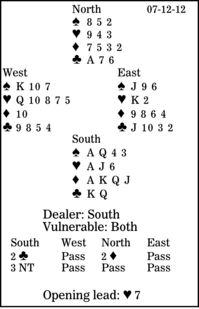Bridge column, July 12: Call on an opponent to help your cause

Occasionally a bridge player will sacrifice a trick to give his opponent, whether dazed, confused or fully aware of the situation, the lead when that opponent must make a beneficial play for declarer.
Today's deal is an example. How should South plan the play in three no-trump after West leads the heart seven and East puts up his king?
South's rebid showed a balanced hand with 25 to 27 points. If responder had had some major-suit length, he would have had to pass unless holding enough strength to expect four no-trump to be safe. There is a solution, which admittedly introduces other problems. The curious should look up Kokish Relay on the Internet.
South seems to have nine top tricks: one spade, one heart, four diamonds and three clubs. But there is a snag: The club suit is blocked and there is no entry to the dummy. What is the solution?
Declarer must call on an opponent to get him into the dummy. South ducks the first trick, wins the heart return (a spade shift does not help), and cashes his minor-suit winners. He then leads the heart jack.
West takes this trick and two more in the suit, but what does he do next?
West is endplayed. He must lead either a club to dummy's ace, or a spade away from his king into South's ace-queen.
** ** **
COPYRIGHT: 2012, UNITED FEATURE SYNDICATE
DISTRIBUTED BY UNIVERSAL UCLICK FOR UFS

